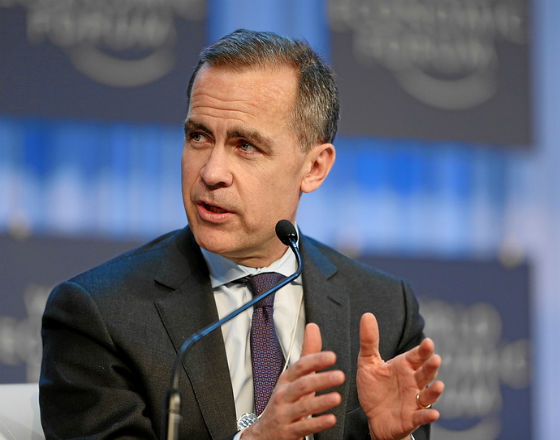German automotive industry at a crossroads
Category: Business

Mark Carney, przyszły szef Banku Anglii (CC By SA WEF)
With interest rates cut to the historic lows, monetary policy makers fell into a liquidity trap, and even repeated series of quantitative easing (QE) by major central banks could not restore pre-crisis growth levels. To fight the crisis central bankers started not only to use innovative policy tools but also begun to change the framework according to which monetary policy has been conducted so far.
In December, Fed for the first time in its history tied its rate setting decision not only to inflation level but also to the unemployment rate. Ben Bernanke, Fed’s Chairman, announced that until unemployment falls to 6.5% and inflation does not exceed 2.5% (2% is Fed’s long run target) Fed will keep the interest rates near zero. In Japan, newly elected Prime Minister Shinzo Abe influenced the Bank of Japan to adopt a higher inflation target, hoping to spur Japanese growth, which has stalled for decades now. And finally also in Britain, Mark Carney who will replace Sir Mervyn King as the Governor of the Bank of England (BoE), is expected to revolutionise the way monetary policy is conducted.
Monetary policy has two objectives: the first is to stabilise inflation and second to try to eliminate the output gap. Views on relative importance of these two vary. In Britain, for instance, the emphasis is put on the first one, in contrast to the United States where the mandate of the Federal Reserve covers both. This is because so far Britain has adopted “flexible inflation targeting”, which reconciles both principles. Trying to hit the inflation target in two years, which is how the BoE interprets flexible targeting, implies that when the inflation target level is achieved it will also lead to closing the output gap, because stable inflation is related to zero output gap.
However recent British experience demonstrates incompleteness of this view. For the past four years inflation was above BoE’s 2% target and output stayed below its sustainable level. The failure of monetary policy to match its objectives with reality indicates a need for change of the current system.
There are high market expectations for policy change for the incoming BoE’s Governor, who so far has held the position of the Governor of the Bank of Canada.
With an extraordinarily severe fiscal squeeze, interest rate at a record 0.5% low, and less scope to increase asset purchases from already high £375 billion level, because of inflation above 2% target it might seem that Mark Carney has no room for action. But the Canadian is regarded as a banker with an initiative and a supporter of an active role of the central bank to reinvigorate the economy. Not yet in the new seat, Mr Carney has already begun a debate on reforming monetary policy by series of recent public speeches.
Mentioning in his speech in Toronto in December that targeting nominal domestic output is potentially a “more powerful” tool for central bankers in a liquidity trap, Carney implied that he gives thought to NGDP growth targeting. A 4.5% NGDP target would imply central bank creating money by variety of methods, such as purchasing bonds, until nominal GDP hits the target, with no particular emphasis on what share of the number is generated by real growth and how much is due to inflation. According to proponents of such measure like Christina Romer, chairwoman of President Obama’s Council of Economic Advisors or Paul Krugman, Economics Nobel Laureate, NGDP target would increase expectations of future growth and induce economic agents to spend more.
However, NGDP targeting opponents draw attention to the fact that it undermines the mandate of preserving price stability, because with a nominal output growth target it is harder to determine how much of the future growth will be in fact real. Hence, it might result in less central bank credibility and more volatile inflation expectations. Key criticism is that Britain might be suffering from a permanent loss of output and productivity (labour productivity is still around 2% below its pre-crisis level according to the Office for National Statistics). Such an explanation of the crisis rather than a cyclical lack of demand implies that the UK economy is more prone to inflation at weaker growth rates than before and NGDP target will most likely result in little real growth and more inflation.
Indeed, speaking before a parliamentary committee in February, Carney refrained from his support of NGDP targeting, admitting that he is far from convinced of its merits as a monetary policy tool, however he repeated importance of “escape velocity” a term he coined at the World Economic Forum in Davos in January.
Although the catchy phrase was not really explained, analysing Carney’s responses at the meeting, one can expect the governor to follow Fed’s path of increasing the importance of central bank signalling through measures such as: conditional commitments to keeping interest rates low for a certain period of time or announcing Fed-like thresholds for inflation and unemployment that have to be met before tightening of the monetary policy. So the BoE power shift implies more dovish monetary policy, expectations of which have already decreased the value of sterling compared to other major currencies.
The biggest challenge for Carney is not really a reform of BoE’s proceedings but gaining market confidence in his actions. Instead of a new cure British economy might just need a placebo to start believing in a recovery and to finally grow. With a change of the BoE’s discourse thorough an initiative for bolder actions the first foreign Governor of the Bank of England might be on the right track to achieve that.
Wodzisław Kiciński – University of Warwick, Analyst of the Warwick Investment Club Research Team.



